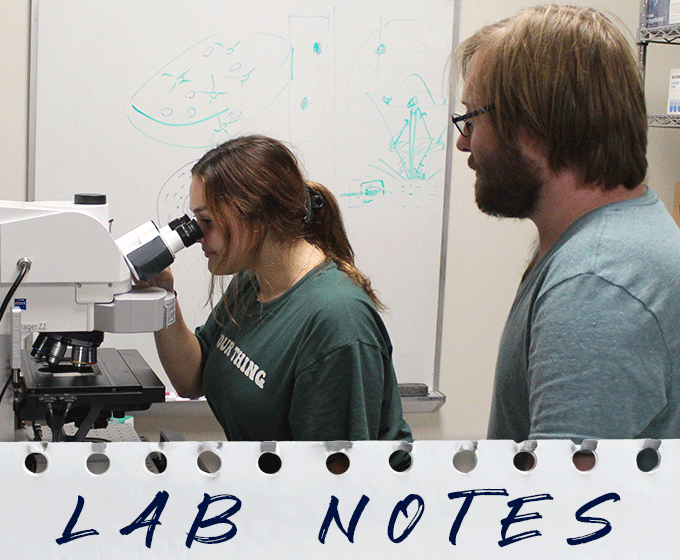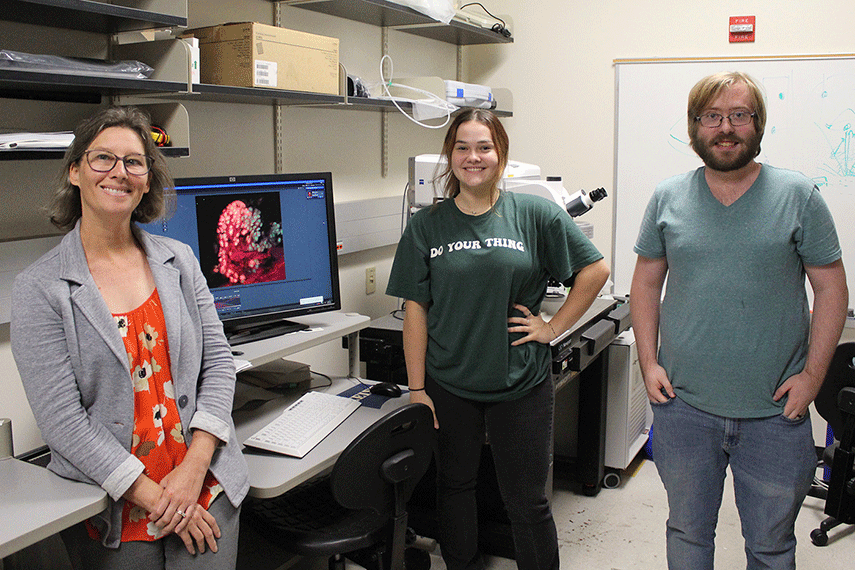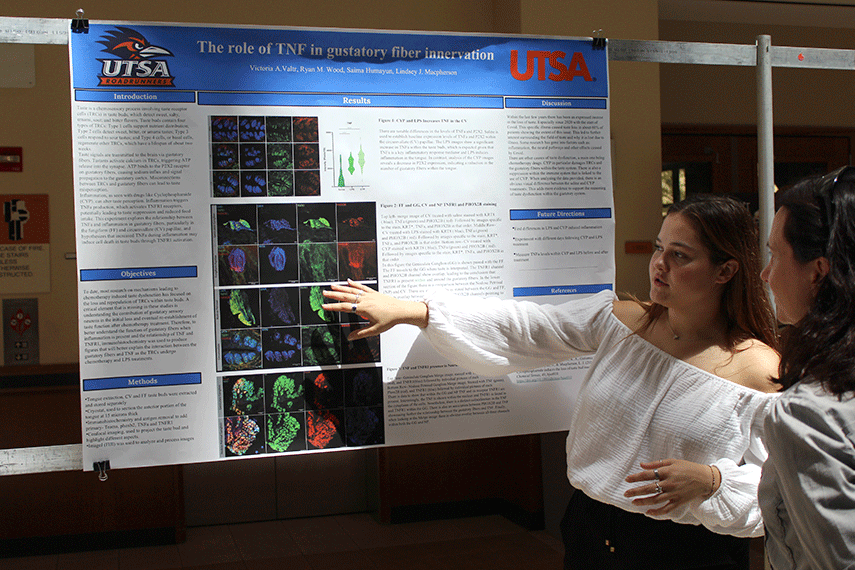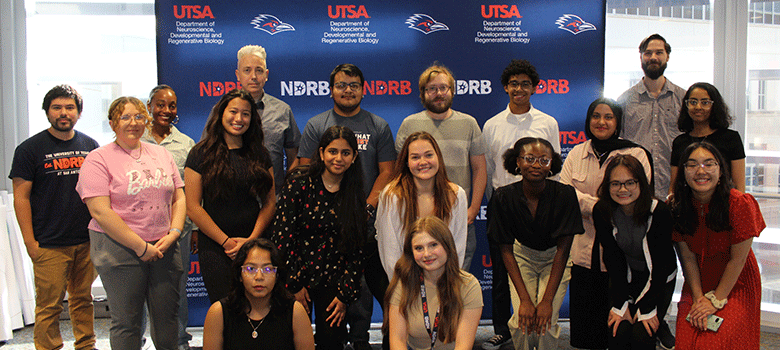
Intern Victoria Valtr and her supervisor, Ryan Wood, working in the Macpherson Lab.
This summer, we’re shining a light on Roadrunner researchers and the innovative work they are doing in labs across campus and beyond.
Today, we explore a UTSA lab where taste is the topic of the day.
JULY 15, 2025 — Students working at The Macpherson Lab this summer are gaining firsthand research experience while trying to uncover the causes behind loss of taste during chemotherapy treatment.
Working under the supervision of Associate Professor Lindsey Macpherson and doctoral student Ryan Wood, the students aim to demystify this phenomenon and bring the medical community one step closer to helping chemotherapy patients eat and maintain proper nutrition throughout their treatment.

Lindsey Macpherson, Victoria Valtr and Ryan Wood in The Macpherson Lab.
Loss of taste is a common side effect of chemotherapy, which often leads to loss of appetite and weight loss. The American Cancer Society describes the problem as manifesting in several ways — from a lack of smell and aversion to certain odors to a metallic or bitter taste accompanying some foods — all of which can lead to undereating, weight loss and delayed healing.
When patients are treated with chemotherapy drugs, it causes inflammation in the tongue and that leads to a lot of taste loss, said Victoria Valtr, an intern working in the lab.
“We’re looking at how we can combat that,” Valtr said. “We want to understand how inflammation is changing [their sense of taste] and we want to find a workaround to get these chemotherapy patients to have all their taste buds restored, to be able to taste food again and to improve their quality of life.”
That is the ultimate goal of the project, she said. “But it starts on the molecular level, trying to understand the root cause of it.”

Intern Victoria Valtr presents her findings from last summer’s research at an NPRE graduation showcase.
Valtr is a biochemistry student at Louisiana State University who began working in the Macpherson Lab in 2024 in the Prefreshman Research Experience (NPRE) program.
Housed in the UTSA College of Sciences, the NPRE program is designed to give recent high school graduates an opportunity to experience hands-on research on campus which serves as a prelude to their undergraduate studies.
Valtr’s first project focused on the molecular mechanisms behind loss of taste and how inflammation reduced the ability to taste through changes in a protein known as TNFα and its receptor, TNFR1.
This summer, Valtr is shifting her focus to oxidative stress as a contributing factor to taste loss and looking at more than just the tongue. Oxidative stress is a type of damage that can occur in both cancerous and healthy tissue during chemotherapy.
“This time, we’re looking at the kidney, the liver and the brain to see the extent of oxidative stress and to try to understand how that may affect taste,” she said.

The 2024 NPRE team gathers for a group photo.
Valtr described the NPRE program as instrumental in boosting her confidence and preparedness for her first year of college.
“The first couple of weeks being in the lab, I had that imposter syndrome, feeling like I'm in a place where all of these people are way smarter than me,” she said. “But once you get out of your shell, it gets easier to say, ‘OK, if I want to become an expert on this topic, I can read a couple papers and start to understand.’ It becomes less intimidating.”
Valtr will continue her work in The Macpherson Lab until late August when she will return to her home university. She hopes to return to the lab in future summers as she builds toward a career in biochemical research.
UTSA Today is produced by University Communications and Marketing, the official news source of The University of Texas at San Antonio. Send your feedback to news@utsa.edu. Keep up-to-date on UTSA news by visiting UTSA Today. Connect with UTSA online at Facebook, Twitter, Youtube and Instagram.
Huddle Against Hunger is a fundraising competition with Texas State that benefits our Roadrunner Pantry. Donations this week will help UTSA earn additional prize monies provided by RBFCU.
In-Person and VirtualJoin UTSA Libraries for an update on federal public access policies and how the library can assist with compliance.
Virtual EventWe invite you to join us for Birds Up! Downtown, an exciting welcome back event designed to connect students with the different departments at the Downtown Campus. Students will have the opportunity to learn about some of the departments on campus, gain access to different resources, and collect some giveaways!
Bill Miller PlazaThere are many citation managers. Which one is right for you? This workshop will explain what a citation manager is and how it can help you organize your citations, insert citations as you write your paper, and generate your bibliography.
Virtual EventPubMed is an essential database for anyone conducting biomedical or health-related research. This workshop will teach attendees how to effectively navigate this free resource and locate peer-reviewed articles using advanced search features, MeSH subject headings, and Boolean operators.
Virtual EventIn this hands-on workshop, participants will learn to setup an EndNote library, save references and PDFs, and automatically create and edit a bibliography. Attendees are encouraged, but not required, to have EndNote already installed on a personal computer.
Virtual EventJoin UTSA Libraries and Museums to learn more about the publishing discounts available for UTSA researchers. Current agreements include Elsevier, Cambridge University Press, Wiley, and more. Bring your questions and feedback for the library as we continue to pursue partnerships with publishers to reduce costs for our researchers.
Virtual EventThe University of Texas at San Antonio is dedicated to the advancement of knowledge through research and discovery, teaching and learning, community engagement and public service. As an institution of access and excellence, UTSA embraces multicultural traditions and serves as a center for intellectual and creative resources as well as a catalyst for socioeconomic development and the commercialization of intellectual property - for Texas, the nation and the world.
To be a premier public research university, providing access to educational excellence and preparing citizen leaders for the global environment.
We encourage an environment of dialogue and discovery, where integrity, excellence, respect, collaboration and innovation are fostered.